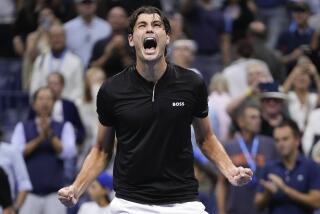Going gets tough, but Jill Craybas wonât quit
From New York â dwyre at US open⌠Yvonne Meusburger, Austria, def. Jill Craybas, United States, 3-6, 7-5, 6-0.
The stars and the attention were on Arthur Ashe Stadium on Tuesday, as they always are during the U.S. Open tennis tournament. The drama was out on Court 8, where dozens were watching.
There, a veteran U.S. player named Jill Craybas, was fighting for her life â at times that almost seemed literally â in a first-round match.
It was incredibly hot. One report had it reaching a humid 96 degrees in Flushing Meadows and 110 on the Ashe court. It was so hot that sportswriters were making sure to hydrate, and most of them hadnât left the air-conditioned press center.
Like so many in the 128-player draws of this 14-day carnival, Craybasâ match was of interest to family and friends. Few of the nearly 60,000 spread over the stadiums and grounds of the USTA Billie Jean King National Tennis Center knew nor cared that she was 36, was playing in her 14th consecutive U.S. Open and was one of two active players holding the lead in consecutive Grand Slam appearances with 41. Italyâs Francesca Schiavone also has 41, but she emerged from the kind of obscurity Craybas plays in with her recent French Open victory.
Craybas was born in Providence, R.I., played for and graduated from the University of Florida and went on the tour in 1996 to find her fame and fortune. Now, 15 years later, playing out of Huntington Beach, she has found only a bit of each, but continues to compete with zeal and the hope of a Schiavone-like run in the future. Her best Grand Slam result is an advance to the fourth round at Wimbledon in 2005. She beat Serena Williams before losing to her sister, Venus.
She has won one singles title, four doubles titles and slightly more than $2 million as a pro. Spread that over 15 years and you have one of the few pro athletes in existence who makes similar money to some of the people interviewing her.
She is 5 feet 3, 123 pounds â think of the body of a marathon runner, only shorter. She exudes fitness, and would be the last player youâd expect to be affected by heat.
âIâve played in much worse than this,â she said later, which apparently meant the mid-July Death Valley Open.
She also said, âI was excited that it was going to be hot. I thought it would be to my advantage.â
She was playing Austrian Yvonne Meusburger, who was 10 spots below Craybasâ No. 109 ranking, was a head taller and 15 pounds heavier. Also 10 years younger.
Craybas won the first set, 6-3, but admitted to feeling nauseated.
âI felt like I needed to throw up, but I couldnât,â she said.
She played on, getting up a break at 3-1 in the second, but clearly suffering. She slowed it down, toweled off a lot. She was taking more than the allotted 30 seconds between points, but both chair umpire Gabriela Zaloga and Meusburger showed amazing patience and empathy.
âIt is hard when you see your opponent struggling,â Meusburger said later.
By late in the second set, when Meusburger was catching her and passing her for a 7-5 victory in the second set, Craybas was in big trouble physically. Several, times during her service games, she walked to the back of the court to a chair in the corner and pushed her right hand down flat on the seat.
âIt was the only way I could get my hand open, so I could get it around the racket to serve,â she said.
She was cramping badly. On the breaks, trainers frantically rubbed ice on her arms and legs. A giant ice pack, resembling something youâd take on a plane to help you sleep, was held in place by a ball boy.
âI thought she would quit,â Meusburger said.
Asked later why she hadnât, Craybas, ashen and weak, looked wide-eyed at the question.
âIâve never retired in a match in my life,â she said.
Womenâs tennis allows a 10-minute break before a third set, if conditions are extreme and one of the players asks.
âIf she hadnât asked,â Meusburger said, âI would have.â
In those 10 minutes, Craybas changed shirts, tried to throw up, failed and came out trying to fight on. She lost the first game at love, then the second in a battle. Clearly, there was no way; going back out had been ill-advised.
Not to Craybas.
âI thought I still had a chance to win,â she said.
The final 6-0 set took 50 minutes. The match was 2 hours 37 minutes.
Two hours after it ended, Craybas gave a short interview to a reporter, short because she was being taken to a doctor. She said she had a virus last week and maybe that was what caused her problems.
She was asked, at age 36, if this experience might prompt an end to her Grand Slam run.
âOh, no,â she said. âAs long as Iâm still having fun, Iâll be playing.â
Last week, John McEnroe made comments about the womenâs tour that some interpreted as a slap at womenâs toughness. So far, the most direct answer to that has come from Jill Craybas, out on Court 8 Tuesday.
More to Read
Go beyond the scoreboard
Get the latest on L.A.'s teams in the daily Sports Report newsletter.
You may occasionally receive promotional content from the Los Angeles Times.











